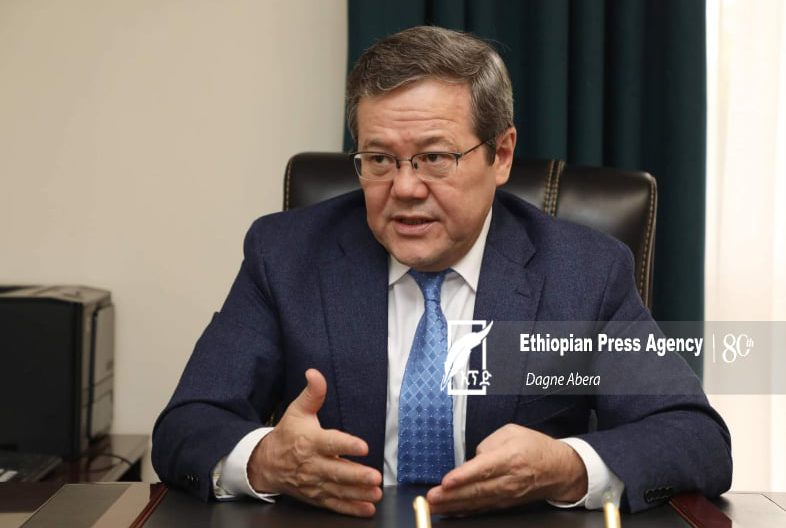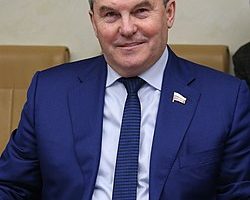
BY HAFTU GEBREGZIABIHER
Addis Ababa is one of the diplomatic hubs of the world. In addition to more than 100 diplomatic missions, it also hosts continental organizations like the African Union and Economic Commission for Africa (ECA) as well as many other international organizations.
Addis Ababa City Administration is also undertaking diverse developmental project that significantly change the view and suitability of the metropolis both to its residents as well as staff of the international community.
The Ethiopian Herald had recently approached one of the diplomatic missions in the city, Embassy of Kazakhstan to Ethiopia to reflect on the ongoing changes of the city.
Avoiding the face-to-face interview due to the COVID-19 pandemic, Haftu Gebrezgabiher of The Ethiopia Herald had an emailed interview with Ambassador of Kazakhstan to Ethiopia, Barlybay Sadykov. Excerpts:
As an ambassador residing in the city of Addis Ababa, how do you describe the recent growth and development projects in the capital and Ethiopia in general?
First of all, I would like to note the progressive growth of the Ethiopian economy. Ethiopia is one of the few countries in the world that has achieved significant economic growth during the pandemic. The growth rate was over 6 percent in 2020 and the IMF predicts an 8.7 percent growth for next year. All over the country, new industrial and transport projects are being commissioned almost every month. This speaks of the great potential inherent in the reforms carried out under the leadership of the forward-looking Government of Abiy Ahmed.
The efforts of the Ethiopian Government to preserve and enhance the potential of the tourism industry are admirable. New tourist sites are being introduced throughout the country, which, together with the traditional cultural heritage and virgin nature, make Ethiopia one of the most popular tourist destinations.
The same praise deserves the Government’s the Green Legacy program. Planting 20 billion seedlings in four years and helping neighboring countries plant 1 billion seedlings this year is a unique Ethiopian experience that other countries need to pay close attention to if they want to halt environmental degradation and achieve the goals of the 2015 Paris Agreement aimed at keeping low levels of carbon dioxide in the atmosphere.
Addis Ababa is unique not only as the highest mountainous capital in Africa, with a year-round mild climate, but also as one of the most dynamically developing capitals in the world. I have been to Addis Ababa before and over the past ten years the city has changed a lot. Skyscrapers, business centers, wide avenues, street junctions, metro have grown. In the last three years alone, projects such as Unity, Sheger, Entoto, Friendship parks, Meskel Square, a zoo, a new library, and numerous museums have been commissioned. If we add to this the carefully protected natural objects – the surrounding mountains, caves, hot springs, then all this makes Addis Ababa an increasingly attractive city for tourists.
Addis is home to the diverse nationalities in Ethiopia with their peculiar culture and history. How do you observe the togetherness and friendship of its residents?
Amiability, friendship, hospitality, resilience to challenges and pride in their country, its history, culture, traditions – this is what I would like to note, first of all, in the inhabitants of Addis Ababa.
The centuries-old history, rich culture and traditions, multicultural society all affected the character and behavior of people and it is always nice to see them smiling and living peacefully in such a metropolis.
I think the culture of relationships in society speaks volumes, which, for example, can be seen in a simple example – in queues on public transport. In long queues at bus stops, people with due discipline wait for their turn to board the bus. After 9 pm there are very few people and cars on the roads, and early in the morning at 5-6 o’clock the city has already woken up and all people are rushing to work. This shows the rhythm of a big city – a great toiler.
If we are talking about Addis Ababa, I also want to say some words about our capital – the city of Nur-Sultan. On July 6, we celebrate the Day of the Capital. It is named so in honor of our First President Nursultan Nazarbayev, who not only initiated the construction of this new capital, but also stood at the origins of sovereign Kazakhstan. This year, Kazakhstan celebrates the 30th anniversary of Independence and under the leadership of the First President Kazakhstan has achieved impressive success in economic and social development. Today the capital of Kazakhstan, Nur-Sultan, is an architecturally beautiful, modern city, an official, scientific, cultural and business center of the country.
What are the similarities between our countries?
I would like to note the similarity in that they are distinguished by their multi-confessional, multi-ethnic and multiculturalism. Representatives of 130 nationalities live in Kazakhstan, professing 18 different religious beliefs. As in Ethiopia, the main value for the Kazakh society is unity, tolerance, respect for representatives of all nationalities and ethnic groups, regardless of their religious affiliation.
If we add about the parallels, we cannot fail to note the active process of political and economic reforms underway in both countries. In March 2019 as a result of the peaceful transit of power, Kassym-Zhomart Tokayev became the head of state and continued the reforms of the first President N. Nazarbayev. People and their well-being were placed at the forefront of all his initiatives.
The basis of his reforms is the concept of the “Hearing State”, which laid fundamentally new foundations for the relationship between the authorities and citizens. The population today sees the results of the ongoing political and social reforms and the level of people’s confidence in the policy of the country’s leadership is now very high. These reforms are the basis for the development of the political, economic and social sphere for the future.
It is important to maintain the historical memory of the people and in the anniversary year we celebrate important milestones in its history, including the activities of famous personalities, not only politicians, but also scientists and cultural figures such as Abay and Al-Farabi, whose anniversaries we celebrated in the past year. This year we celebrate the anniversaries of a whole pleiad of outstanding figures who made a huge contribution to the independence and development of Kazakhstan – the enlightener of the Kazakh people Ibrai Altynsarin, the fighter for the independence of Kazakhstan Alikhan Bukeikhan, outstanding poets Zhambyl Zhabayev and Mukagali Makatayev, a virtuoso musician and composer Dina Nurpeisova, world famous wrestler Khadzhimukan Munaitpasov.
Apart from being capital of the country, Addis is also the continental capital hosting the regional blocs Headquarter and the UNECA. What is your say on this regard? How Addis is important for the diplomatic community?
Addis Ababa is the political, diplomatic capital of Africa, where important decisions are made both for the continent and for the rest of the world. It became such due to various factors, one of which is the recognition of the important role and weight of Ethiopia in the history, politics, economy and modern life of the continent.
Therefore, the importance that Addis Ababa has for the diplomatic community cannot be overestimated. It is very important for Kazakhstan to have its own embassy here, as it helps to develop relations with Ethiopia and with all countries of the continent through the multilateral structures located here. Kazakhstan is interested in closer cooperation with Ethiopia and we need to use effectively vast potential we have to interact in the field of economy, trade and investment.
Just like Ethiopia, Kazakhstan attaches great importance to multilateral diplomacy. Our countries closely interacted in the UN Security Council in 2017-18. Like Addis Ababa, Kazakhstan’s largest city, Almaty, is a multilateral diplomacy hub for the vast Eurasian region. There are 18 UN agencies, funds and programs represented in Almaty.
What would you like to wish the residents of Addis Ababa?
Addis Ababa is a beautiful city and thanks to the residents of the capital, it becomes more and more beautiful every day. I would like to wish all residents of the capital peace, tranquility, success in the implementation of such important projects that make the city much more comfortable and convenient for work and living.
Thank you.
The Ethiopian Herald June 26/2021





